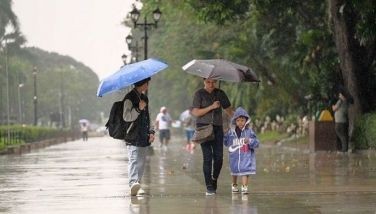DepEd bridge program now optional
June 9, 2004 | 12:00am
Parents of public elementary school children will be given the option to decide whether their children should take a one-year preparatory study program before entering high school.
The Department of Education (DepEd) has decided to make its so-called "bridge program" optional after failing to get the go-ahead of parents who don’t want the additional cost of putting their child through school.
The decision was reached in a meeting last Monday with DepEd officials, Education Secretary Edilberto de Jesus revealed yesterday at a press forum.
"We decided to make the bridge program optional despite the evidence of the High School Readiness Test (HSRT)," De Jesus said, referring to the low number of school children who passed the exam.
At least half of the 1.5 million to 1.6 million public school students who took the HSRT on May 24 failed to meet the low cut-off score of 30 percent.
Passing meant correctly answering only a minimum of 27 questions in the 90-item test.
Government officials said the large number of those who failed the test proved that measures were needed to ensure that children get the needed education.
Another exam will be given at the end of the first grading period to gauge students’ competencies, De Jesus said.
"We’re fairly certain that the scores will not be dramatically different from the HSRT. Again, parents will have to make a choice. They have the evidence of the first HSRT, the second HSRT after the grading period and we’ll tell them they still have a choice, although we’ll strongly recommend that their children take the bridge program," he said.
The DepEd originally proposed that those who did not pass the examination will have to take a mandatory one-year preparatory study in English, science and mathematics — or what the department calls a "bridge program" — before entering high school.
However, the proposal drew mixed reactions from parents. Those who were not in favor said the extra study year would mean an additional cost of sending a child to school.
Education experts say the Philippines is the only country that has a 10-year primary and secondary education program while other countries have at least 11 years of schooling.
The extra year could mean producing a better-educated workforce that could, in turn, benefit the country’s economy in the long run, experts say.
An opinion poll conducted last year, however, revealed that seven out of every 10 household heads nationwide agree with the HSRT exam.
Seventy percent of 1,200 respondents surveyed by respected pollster Social Weather Stations (SWS) agree with the bridge program while 20 percent disagreed and 10 percent were undecided. — With Rainier Allan Ronda
The Department of Education (DepEd) has decided to make its so-called "bridge program" optional after failing to get the go-ahead of parents who don’t want the additional cost of putting their child through school.
The decision was reached in a meeting last Monday with DepEd officials, Education Secretary Edilberto de Jesus revealed yesterday at a press forum.
"We decided to make the bridge program optional despite the evidence of the High School Readiness Test (HSRT)," De Jesus said, referring to the low number of school children who passed the exam.
At least half of the 1.5 million to 1.6 million public school students who took the HSRT on May 24 failed to meet the low cut-off score of 30 percent.
Passing meant correctly answering only a minimum of 27 questions in the 90-item test.
Government officials said the large number of those who failed the test proved that measures were needed to ensure that children get the needed education.
Another exam will be given at the end of the first grading period to gauge students’ competencies, De Jesus said.
"We’re fairly certain that the scores will not be dramatically different from the HSRT. Again, parents will have to make a choice. They have the evidence of the first HSRT, the second HSRT after the grading period and we’ll tell them they still have a choice, although we’ll strongly recommend that their children take the bridge program," he said.
The DepEd originally proposed that those who did not pass the examination will have to take a mandatory one-year preparatory study in English, science and mathematics — or what the department calls a "bridge program" — before entering high school.
However, the proposal drew mixed reactions from parents. Those who were not in favor said the extra study year would mean an additional cost of sending a child to school.
Education experts say the Philippines is the only country that has a 10-year primary and secondary education program while other countries have at least 11 years of schooling.
The extra year could mean producing a better-educated workforce that could, in turn, benefit the country’s economy in the long run, experts say.
An opinion poll conducted last year, however, revealed that seven out of every 10 household heads nationwide agree with the HSRT exam.
Seventy percent of 1,200 respondents surveyed by respected pollster Social Weather Stations (SWS) agree with the bridge program while 20 percent disagreed and 10 percent were undecided. — With Rainier Allan Ronda
BrandSpace Articles
<
>
- Latest
- Trending
Trending
Latest
Trending
Latest
Recommended































